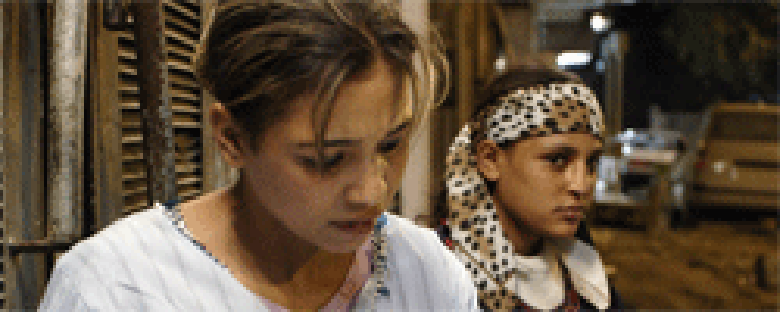Reviews
El-Banate dol
Tahani Rached
Egypt, 2006
Credits
Review by Jenny Jediny
Posted on 16 October 2006
Source Studio Misr 35mm print
Related articles
Features: The 44th New York Film Festival
Tahani Rached’s surveillance piece follows a group of teenage girls living on the streets of Cairo, most of whom have left their homes voluntarily. The rampant cultural misogyny present in the film indicates that perhaps these girls had little choice at home, although during the course of the documentary it is difficult to discern where they might have flourished in safety, as the street only offers a sickening and fairly inevitable outcome to their young lives. A filmmaker’s interest in this group is quickly understood — they are not only willing to speak to the camera, but openly and without hesitation, becoming endlessly watchable subjects, but to what end? In the course of this short, merely 68-minute documentary, Rached easily blurs the line between subject and object, and certainly between compassion and exploitation.
The teenagers documented initially portray a vigorous, self-reliant air. Bluntly addressing the camera, these girls state their names and their situation without embarrassment or fear. Many have left home in fear of their parents, after abuse by a father or threatened with death after becoming pregnant in wedlock (one of the major narrative threads follows a pregnant girl whose father continuously roams the streets with the intention to kill her and her baby). They have been raped repeatedly, often by groups of men, and calmly describe the circumstances, relating that there is little they can do but accept these situations as they occur, and pray. It becomes clear that these girls are not inanely optimistic in their energy, as their often manic behavior is partially influenced by the drugs they constantly take, namely pills and sniffing glue.
These Girls is a nauseating experience, and understandably so — these women appear not only powerless, but destined for an inevitably short and miserable life. They live in poverty, have little chance of escaping the street and give birth to children who are recognized by neither the state nor their families. Rached doesn’t avoid this reality — by the end of the film, many of the girls have admitted they are relentlessly sad and depressed, and that their laughter comes from a very hollow place — but she backtracks too often to a false sense of hope. Perhaps it’s easy to see the girls’ bond with each other as encouraging or as a symbol of unity, but it is also rather inevitable that a connection will be made between people forced into any particular situation, whether positive or negative. The repeated shots of Tata, one of the strongest personalities, riding in the Cairo streets on a stolen horse, is not necessarily an image of joy or freedom, but rather the very lack of it.
The subject matter documented in These Girls is undeniably crucial, and Rached’s effort at not only finding these girls, but also gaining their trust and their stories is commendable. What remains in question is her ability to convey not only the dire situation of these women, but also the political implications involved in presenting a cultural issue that affects women on a global level. While the women in Rached’s documentary had my complete attention, I had not so much the feeling of participating in a dialogue as that unfortunate tendency of not being able to avert my eyes from a car wreck.
We don’t do comments anymore, but you may contact us here or find us on Twitter or Facebook.



